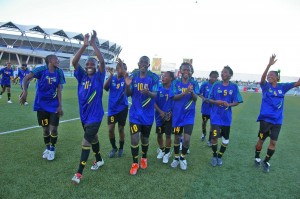Compiled by Donovan Mc Grath
Tanzania: Mixing elections with gold mining – New African (July 2010, No. 497)
According to reporter Sakina Zainul Datoo, ‘President Jakaya Kikwete’s ruling CCM party . . . is facing (in the elections) its stiffest electoral competition.’ Apparently, civil servants have ‘threatened to go on strike if their minimum monthly wage of Tsh60,000 ($43) is not increased to Tsh315,000 ($224).’ They also ‘threatened to shift their voting allegiance elsewhere too.’
The President responded with a harsh tone, saying that the country could not afford such a demand, and the minimum salary could only be increased to Tsh105,000 ($75) this year. Furthermore, ‘he warned the civil servants that they would be replaced if they went on strike.’
There is the feeling that if the government tightened the loopholes in the mining contracts it issues to foreign companies, through the substantial revenue incurred, it would be able to afford its civil servants a reasonable salary.
Extract continues: ‘Tanzania is endowed with riches beyond imagination under its soil [gold, diamonds, silver, tantalite, coltan, steel, iron ore, emeralds and sapphires. There are also deposits of cobalt, copper, natural gas, nickel and titanium]. . . ‘But despite all this wealth, which has made foreign mining companies super-rich, most Tanzanians still live in the agony of poverty.’
As a response to media criticism at the way the mining sector has been handled, President Kikwete formed a commission in 2007 ‘chaired by Judge Mark Bomani to probe accusations of “theft” of natural resources and human rights violations. This Commission found that Tanzania did not benefit sufficiently from the multitude of natural resources under its soil.’ A new Mining Act was passed on 23 April 2010 as a result of the Commission’s findings. ‘However, for all the goodwill that went into reviewing the mining sector, the new law still does not offer any significant changes. One major component absent from the new law is an extremely important “windfall tax” clause. . ‘Of the seven gold mining companies operating in Tanzania, only one, Geita Gold Mine (GGM), owned by Anglo Gold Ashanti, has paid any corporate tax. . .’
In what can be described as a ‘lost opportunity’, a joint 2008 report titled: “A Golden Opportunity” by the Christian Council of Tanzania (CCT), the National Muslim Council (BAKWATA) and the Tanzania Episcopal Conference (TEC) in collaboration with Christian Aid (UK) and Norwegian Church Aid showed that the government had incurred great losses of tax revenue from mining. “We calculate that Tanzania has lost at least $265.5m in recent years as a result of an excessively low royalty rate, and government tax concessions that allow companies to avoid paying corporate tax”…’
The report also shows that ‘over the last five years, Tanzania exported gold worth more than $2.5bn but only received $21.7m a year in royalties and taxes while the expectation was to get $100m annually.’
Presidents support Nyerere beatification – The Tablet 12.06.10
‘Two African leaders have voiced support for the canonisation of Julius Nyerere, Tanzania’s founding president . . .’
Extract: ‘On 1 June, speaking at the Catholic Martyrs’ Shrine at Namugongo, in Uganda, the Ugandan President Yoweri Museveni paid tribute to the man known in neighbouring Tanzania as “Mwalimu” (teacher) or “Baba wa Taifa” (Father of the Nation). . . “We should continue praying that [Nyerere] reaches a stage where he could be declared a blessing of God” [said Mr Museveni].
‘President Jakaya Kikwete of Tanzania echoed Mr Museveni’s words…
‘The campaign to canonise Nyrere began on 26 January 2006 when the Vatican accepted a request from the Bishop of Musoma in northern Tanzania to consider his cause. The Vatican then granted him the title of “Servant of God”.’
Sea Turtles: Tanzania – The [London] Guardian 22.05.10
‘Sea turtles on Tanzania’s Mafia Island have surged since local people were paid to stop eating them. Anybody who finds and reports a nest gets payment up front, followed by a second payment depending on how many eggs hatch. When the scheme began in 2001, every one of the 150 nests on the island of 41,000 people suffered poaching – a figure which fell to less than 1% in 2004. Over that time the number of hatchlings increased from 1,200 to more than 10,000, although this probably includes the effect of higher discovery rates too.’
Game for anything: safari that thinks it’s a beach holiday – The Observer 14.02.10
As East Africa’s only coastal game reserve, Saadani National Park is in a unique location. Nicola Iseard entices readers to experience the excitement and beauty of the surrounding area, and the warmth of the local people.
Extract: ‘. . . The beauty of the Saadani Safari Lodge: it is as much about the people, the locals, as it is the wildlife. . . [here] you live with the locals. . . When national parks are proclaimed, communities are often resettled outside the park in an endeavour to control human/wildlife conflict. But at Saadani the wildlife and the village, which is one of the oldest settlements in Tanzania (dating from the sixth century), manage to co-exist. . . The lodge . . . the only safari camp inside the park . . . is considered part of the community . . .’
Tanzania: [Commercial Bank Launch] – The Tablet 10.04.10
Extract: ‘The Catholic Church in Tanzania has officially launched its Mkombozi Commercial Bank in a bid to alleviate poverty and boost its own self-sufficiency . . . The bank, which operates from the premises of St Joseph’s Catholic Cathedral . . . Dar es Salaam, pledges to accept clients of all faiths, with an emphasis on “the lower income segment” of society. . . The bank, which has been operational since August [2009], offered financial education and business management training, and pledged to make loans available to small-scale farmers. . .’ Thank you Doreen E. Woodford for this item – Editor.
HIV prevention – Martlet (Spring 2010) [Pembroke College, Cambridge, newsletter]
The following is a short extract of a report by Francesca Woodburn, who founded the charity Empuaan which aims to reduce the spread of HIV in northern Tanzania.
‘. . . In East Africa the Maasai are now experiencing the early stages of what is likely to be a catastrophic epidemic. To the Maasai, HIV is a “new” disease and a new threat, and most remain uniformed, unprepared and unprotected. . . When I took a job at a newly established secondary school for Maasai students in Tanzania . . . I saw . . . lovely young people enjoying all the pleasures of youth completely unaware of the danger to which they were exposed. . .’ As a result, Woodburn founded Empuaan (‘Survival’ in Maasai). ‘A key element of Empuaan’s work is to provide reliable, up-to-date information on HIV in a culturally accessible way and to provide forums for critical thinking and decision-making through discussion of social issues relating to HIV, its transmission and impact. . . Empuaan liaises with both governmental and non-governmental agencies to distribute condoms in rural areas. . . Empuaan’s most recent initiative is [their] Youth Literature Project [HIV awareness booklets distributed freely] . . . written in both Swahili and Maasai. . .’
Tanzania: The illegal trade in ivory
March 29 issue of The East African included two articles by Mike Mande highlighting the March 2010 report issued by the London-based Environmental Investigation Agency (EIA) and the Journalists’ Environmental Association of Tanzania following a joint investigation into poaching and the illegal trade in ivory.
The first article is headed: ‘Organised poaching, illegal trade – why Tanzania lost out at Cites meet’.
Extract: ‘A new investigation by a panel of international and local experts that implicated senior government officials in the illegal ivory trade and the rise of elephant poaching in Tanzania is believed to have led to the country being denied permission for a one-off sale of its $20 million ivory stockpile [see TA No 96 for a related article]. ‘The report . . . says the illegal international trade in ivory is conducted by organised criminal syndicates with the collusion of corrupt Tanzanian officials. . .
The report . . . says the most recent Elephant Trade Information System (ETIS) analysis reveals that the country’s scale of its involvement is second only to that of China . . .’
Mande’s second article is entitled: ‘Tusks flooding out of Selous during the rainy season’. Extract: ‘. . . Investigations conducted by the [EIA and the Journalists’ Environmental Association of Tanzania] have found that the price for raw ivory at the village level at Mloka stands at $19 per kilogramme, with buyers often being retired army, police and government officials, who also help provide firearms to the poachers. . . The Executive Director of the association, John Chikomo said that local villagers told them that from Mloka, the ivory is transported to Dar es Salaam in small consignments, sometimes by public bus but also concealed in government vehicles that are never stopped at checkpoints . . . The investigations confirm that ivory is flowing out of the Selous, with the connivance of rangers working in the reserve. . .’
Press handouts can save the lives of children – The Independent 12.04.10
‘Western subsidies help Tanzanian reporters expose health risks to babies and the fight against Aids . . .’
Extract continues: ‘Over 1.8 million adults in Tanzania are infected with HIV and when the government declared Aids a national disaster Simon Kivamwo set up AJAAT [Association of Journalists Against Aids in Tanzania] which was founded in 2003 with the primary objective of improving reporting about Aids. . . With a grant from the newly established Tanzania Media Fund , AJAAT has organised training workshops for journalists and is now publishing a weekly newsletter. . .
‘For Pendo Ndovie a grant to hire a car was the means to exposing a scandal involving fake baby food affecting babies throughout Tanzania. . . A small grant gave her the means to develop the story and she eventually accumulated sufficient evidence to publish a series of articles which led to the product being banned from sale. One of the objectives of the media fund is to encourage independent journalism which roots out corruption in public life. ‘ Thank you Elsbeth Court and Julian Marcus for this item – Editor.
BG Group buys into 3 Tanzania offshore gas blocks in Mtwara – The East African (14-20 Jun 10)
Extract: ‘British energy firm BG Group, has acquired a 60 per cent stake in Ophir Energy Ltd, a company licensed to explore and produce liquefied natural gas in Tanzania. The Tanzania government has approved the deal . . . The three blocks cover more than 27,000 square kilometres of the Mafia Deep Offshore basin and the northern portion of the Ruvuma basin located in water depths ranging from about 100 metres to 3,000 metres. . . Alan Stein, the managing director of Ophir Energy plc told The EastAfrican . . . that after completion of the initial work programme, BG Group may withdraw from each of the production sharing agreements or it may assume control and continue to fund 85 per cent of all costs through to the completion of an extended work programme which will involve drilling several more wells.’
Dar bans export of raw tanzanite – The East African (14 June)
Extract: ‘Tanzania has banned the export of raw tanzanite gemstone. Minister of Energy and Minerals William Ngeleja announced the embargo saying the action was taken to spur development of the local processing industry, thereby boosting the economy and recouping profits. . . This is a blow to India’s second largest city of Jaipur, the main importer of the mineral. Tanzanite accounts for one-third of the annual gem imports of Jaipur and employs nearly 250,000 people in cutting and polishing the raw gem for re-export. Industry players in India fear Tanzania may extend the ban to the export of all raw material including diamonds, emeralds, rubies, sapphires, turquoise and topaz. . . According to Jagdish Tambi of KL Tambi of Jaipur, Tanzania’s move is ill-advised as the country does not have the capacity to cut and polish the gemstone.
However, Tanzania Mineral Dealers Association (Tamida) chairman Sammy Mollel disputes this, saying the country has over 400 qualified experts in cutting and polishing tanzanite. “Cutting tanzanite locally will minimise smuggling, create employment for local people, help the industry and contribute more to the government in terms of revenue he said. . . . It is estimated the tanzanite nets about $100 million annually while the finished gems are sold for over $500 million annually. . .’
Elections in Tanzania: What’s the hurry? – The Economist (05.06.10)
‘The president is trying, without much luck, to gee things up.’ Extract: The World Bank now ranks Tanzania a lacklustre 131st in the world, dropping steadily down the league as a place for doing business. Neighbouring Uganda comes in at 112th, with Kenya in 95th place. Tanzania is the laggard in a poor field. A local brand of socialism first promoted by Tanzania’s founding president, Julius Nyerere, helped give its 44m people a sense of unity but failed to equip them for the 21st century. The country still feels elephantine, its infrastructure is rickety, its electricity patchy, most of its roads unpaved and potholed. . . Tanzania’s economy is ticking along. This year it may grow by 6%. . .
President Kikwete has at least tried to give the appearance of curbing corruption. . . Visiting businessmen, however, say they are still deterred by red tape, a weak legal system and lack of skilled labour. Above all, they say, Tanzanians seem to lack a sense of urgency.’ Thank you David Leishman for this item – Editor.
Climate change heating up Lake Tanganyika, fish catches dropping – The East African (31 May-6 Jun 10)
Extract: ‘Lake Tanganyika, East Africa’s second biggest inland water mass, is at its warmest in at least 1,500 years, threatening its ecosystem. This is according to a new scientific study published in Nature Geoscience.
‘Scientists say the lake has been heating up in the past 90 years, which means that in future, the 200,000 tonnes of fish caught annually . . . could be under threat.
‘The lake, which straddles the border between Tanzania, Burundi, Zambia and Democratic Republic of Congo, is a vital source of protein for the thousands of people living on its shores. It is also a source of employment for the hundreds of fishermen who take their boats out each day.
‘The scientific journal says that there is already evidence that the lake has become less productive, while analyses of lake sediment show that the unprecedented warming could be attributed to climate change. . . Scientific experts also acknowledge that other factors, like excessive fishing, may be doing more harm than any global warming at present.’



